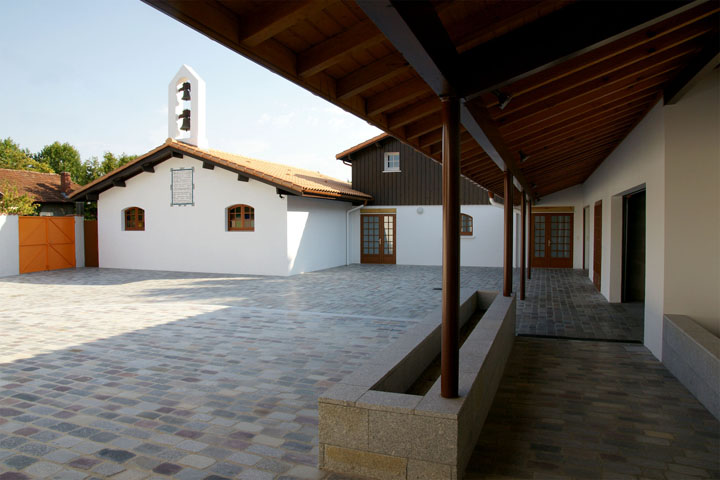
The believer of a religion or a sect tries to
be saved personally by strictly abiding by the
dogmae and rules of the religion or sect. An Arès Pilgrim
is saved by his or her personal pénitence
and apostolate or harvest of penitents. His or
her conscience relies on The Revelation of Arès intead
of dogmae and rules ; he or she knows that only practiced
Good saves. Which accounts for the Arès Pilgrims'
not making up a religion or a sect; they constitute a
spiritual movement, which is nothing but a bright rebirth
of original Christianity, which they quite simply call
spiritual life.
The inelaborate salutary spiritual life is what people
come and look for in Arès.
The simple concern for penitence or Good
has driven away from the Arès Pilgrimage a number of
complicating matters characteristic of religions and
their specific pieties and pilgrimages. At Arès no
caremony or rite is set, only respect is set. An Arès
Pilgrim can unabashedly read the Bible, de Quran, the Veda
and other pious books, though he regards The
Revelation of Arès as the pure Word, as the sifter
that permits the appearance of the Truth from the dark
massed matter of a thousand beliefs, for the Truth is
hidden everywhere in the sand of the religious desert.
Salvation is not found in texts, anyhow, but it is found
in a life turned to Good. At Arès it is in the Fire
of Good that you will rekindle your faith (Rev
of Arès xLi/1-10), which is more than belief, power
to change your life (30/11) and change
the world (28/7).
Human beings of various religions can see differences
between them and sound very doubtful as to their likely
affinities. An Arès Pilgrim never see the
differences between men. All of men yearn for Good.
This reduction of various forms of faith to the common
denominator which Truth is — Truth is that
the world has to change, says The
Revelation of Arès (28/7) — is very difficult to
explain to the public; our missionaries are well-aware of
it. We look like simplistic people without an ounce of
personality. When people ask us, "What are you after
all? What do you do?" we reply, "Humans of intense
spiritual inner made of loving the neighbor,
forgiving all offenses, making peace, thinking and
speaking with warmhearted intelligence and being
free of all prejudices. All this goes off in each
Arès Pilgrim's heart of hearts; we call it penitence,
because it awakens the image and likeness of the
Father (Genesis 1/26-27) deep down, but it is as
unseen as Him in the eyes of mankind until His Day
comes (Rev of Arès 31/8).
What brings us together and gives us power is our shared
belief that only Good conquers Evil
and saves the individual as well as the world.
It is only on the Arès Pilgrimage place that you can
definitely see something visible and distintive in the
Arès Pilgrims: The Place where the Saint appeared
in 1977, the pilgrim's tunic and bare feet, his
or her prayer or meditation.
The Pilgrimage is very important to me, because I sort of
live through there what I lived through in 1974 and 1977
when Jesus and the Father spoke to me. It is a sacred time
of uppermost refinement and love. It is the same thing to
my brothers and sisters of faith, because they are my own
witnesses.
So to speak the Pilgrimage is the drive to reach Life
(Rev of Arès 24/3-5). Whenever people ask me, "How
can you be hale and hearty at your age?" I have several
answers and among them this, "I go on the Pilgrimage."
The Arès Pilgrimage is a special place and time. It has
done away with all that religions have exploited in
history with their pilgrimages numerous on the planet.
Religion makes the believer a wolf, a wolf in its
religious pack. The Arès Pilgrimage makes man a man, a man
of the whole world, the world that an Arès Pilgrim strives
to change so as to spare it the sin of sins
(Rev of Arès 38/2).
Spiritual life, penitence, Pilgrimage are not
actions achieved on top of or off everyday life.
An Arès Pilgrim regard them as everyday life.
The Arès Pilgrimage aims to give spiritual life and, once
spiritual life is gained, aims to make it grow stronger
and stronger.
In summer at Arès, France (33740, Gironde),
46 avenue de la Libération, June 21 to July 4,
from July 12 to July 25,
and from August 2 to August 15.
The Maison de la Ste-Parole (House of the Saint's Word,
where the Creator spoke in 1977) is open
on Monday, Tuesday, Wednesday and Thurday 18:00 to
21:00,
on Friday 08:30 to 11:30
on Saturday and Sunday, also on July 14 and August 15
(except when they fall on a Friday) 17:30 to 21:00
Each pilgrim prays and/or meditates freely without
bothering other pilgrimsss.
---> Copyright
Michel Potay 2014
|
